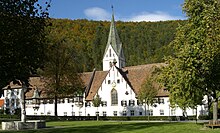Wilhelm Haecker
Wilhelm Häcker (born May 9, 1877 in Ebersbach an der Fils , † January 10, 1959 in Blaubeuren ) was a German Protestant theologian and teacher who became known through his friendship with Hermann Hesse .
Life
Wilhelm Häcker initially embarked on a Protestant theological career and attended the Protestant theological seminar in Maulbronn . There he shared a room with the later writer Hermann Hesse of the same age . He witnessed how the "rebellious" character showed in this in March 1892. Hesse escaped from the seminar because he either wanted to become a poet or nothing at all and was only picked up in the open the following day. Häcker had a close friendship with Hesse throughout his life. When Hesse visited Ulm, he usually also met Häcker.
While Hesse actually became a poet and not a theologian, Wilhelm Häcker decided to study philology at the University of Tübingen . In 1901 he was promoted to Dr. phil. PhD.
From 1906 to 1912, Häcker worked as senior prefect in Aalen . He then became a professor at the seminar in Maulbronn , in 1923 he went to the seminar in Blaubeuren, Klosterhof 7. In 1942, in the middle of the Second World War , Häcker retired. He held the title of professor and stayed in Blaubeuren, where he died in 1959 at the age of 82 in 1959.
Honors
In his book Nürnberger Reise, Hermann Hesse set a lasting monument in the person of the boy Wilhelm .
family
Wilhelm Häcker married Hedwig born Pfahler in 1911 (born April 1, 1890 in Mühlheim near Horb am Neckar). There were no children from the marriage.
literature
- Hermann Hummel: Wilhelm Häcker, a friend of Hermann Hesse , in: Geist und Kirche. Blaubeurer monastery students and seminarians, biographical sketches from four centuries . [Ulm] 1998, pp. 56-59.
Web links
- Literature by and about Wilhelm Häcker in the catalog of the German National Library
- Entry in the Baden-Württemberg state bibliography online
Individual evidence
- ^ Hermann Hesse and Ulm, first part
- ↑ Nuremberg trip
- ^ Genealogical data at the Association for Computer Genealogy
| personal data | |
|---|---|
| SURNAME | Häcker, Wilhelm |
| BRIEF DESCRIPTION | German teacher |
| DATE OF BIRTH | May 9, 1877 |
| PLACE OF BIRTH | Ebersbach an der Fils |
| DATE OF DEATH | January 10, 1959 |
| Place of death | Blaubeuren |
